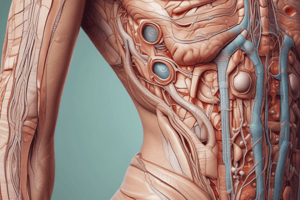Podcast
Questions and Answers
Where is smooth muscle found in the body?
Where is smooth muscle found in the body?
- Only in the walls of blood vessels
- Only in the hair follicles of the skin
- In the walls of blood vessels, associated with hair follicles in the skin, and in the walls of various structures associated with the gastrointestinal, respiratory, and genitourinary systems (correct)
- Only in the walls of the gastrointestinal, respiratory, and genitourinary systems
What are the triggers for smooth muscle contraction?
What are the triggers for smooth muscle contraction?
- Hormones, neural stimulation, and local factors, such as the walls of visceral organs, stretching the muscle can trigger its contraction (the stretch-relaxation response) (correct)
- Only hormones
- Only neural stimulation
- Only local factors, such as the walls of visceral organs
What is the key difference between cardiac muscle and skeletal muscle?
What is the key difference between cardiac muscle and skeletal muscle?
- Cardiac muscle is striated, while skeletal muscle is not
- Cardiac muscle is involuntary, while skeletal muscle is voluntary (correct)
- Cardiac muscle is resistant to fatigue, while skeletal muscle is not
- Cardiac muscle contractions are more powerful than those of skeletal muscle
What type of joint is the suture of the vault of the skull?
What type of joint is the suture of the vault of the skull?
What is the defining characteristic of a primary cartilaginous joint?
What is the defining characteristic of a primary cartilaginous joint?
What is the primary function of an aponeurosis?
What is the primary function of an aponeurosis?
What is the main characteristic of a raphe?
What is the main characteristic of a raphe?
What is the approximate ratio of motor to sensory nerve fibers in skeletal muscles?
What is the approximate ratio of motor to sensory nerve fibers in skeletal muscles?
Which of the following muscles stabilize joints or prevent unwanted movements during the action of prime movers?
Which of the following muscles stabilize joints or prevent unwanted movements during the action of prime movers?
Which type of muscle fibers are responsible for slow and sustained contractions?
Which type of muscle fibers are responsible for slow and sustained contractions?
Which of the following statements about smooth muscle is NOT true?
Which of the following statements about smooth muscle is NOT true?
Which of the following is NOT a function of the skin?
Which of the following is NOT a function of the skin?
Which of the following cells in the epidermis produce keratin?
Which of the following cells in the epidermis produce keratin?
What is the primary function of melanocytes in the epidermis?
What is the primary function of melanocytes in the epidermis?
Which of the following structures is NOT considered an appendage of the dermis?
Which of the following structures is NOT considered an appendage of the dermis?
What is the primary function of fascia in the human body?
What is the primary function of fascia in the human body?
What is the primary component of fascia?
What is the primary component of fascia?
Study Notes
Smooth Muscle Location and Contraction
- Found in walls of hollow organs such as the intestines, blood vessels, bladder, and uterus.
- Contraction triggered by autonomic nervous system, hormones, and local factors like stretch.
Cardiac vs. Skeletal Muscle
- Cardiac muscle is involuntary and has intercalated discs for synchronized contractions; skeletal muscle is voluntary and long, cylindrical in shape.
Skull Suture
- The suture of the vault of the skull is a fibrous joint, classified as a synarthrosis that permits very limited movement.
Primary Cartilaginous Joint
- Defined by the presence of hyaline cartilage that connects bones and allows slight movement; examples include the joint between ribs and sternum.
Function of Aponeurosis
- Functions as a flat fibrous sheet that connects muscles to the parts they move, providing strength and support.
Characteristic of a Raphe
- A raphe is a seam-like structure formed by the fusion of two opposing tissue layers, often seen in muscular or tendinous connections.
Motor to Sensory Nerve Fibers Ratio in Skeletal Muscles
- Approximately equal ratio, with slight variations depending on the specific muscle and its function.
Stabilizing Muscles
- Muscles that stabilize joints or prevent unwanted movements during the action of prime movers are known as synergists.
Muscle Fibers for Slow Contractions
- Type I muscle fibers, also known as slow-twitch fibers, are responsible for endurance and sustained contractions.
Misconceptions about Smooth Muscle
- Contrary to some beliefs, smooth muscle exhibits spontaneous contraction and can function independently of nervous stimulation.
Skin Functions
- The skin primarily protects against pathogens, regulates temperature, and provides sensory information; it does not directly participate in hormone production.
Epidermis Cells and Keratin Production
- Keratinocytes produce keratin in the epidermis, contributing to the protective outer layer of the skin.
Primary Function of Melanocytes
- Melanocytes produce melanin, the pigment responsible for skin color and UV protection in the epidermis.
Dermis Appendages
- Structures not considered appendages of the dermis include the epidermis itself; dermal appendages are hair follicles and sweat glands.
Primary Function of Fascia
- Fascia serves to support and compartmentalize muscles and organs, facilitating movement and reducing friction.
Component of Fascia
- Primarily composed of dense connective tissue, providing strength and structural integrity.
Studying That Suits You
Use AI to generate personalized quizzes and flashcards to suit your learning preferences.
Description
Explore the basic structures of the skin in human anatomy, focusing on the epidermis and its functions such as protection from external influences, temperature regulation, and sensation. Learn about the role of keratinocytes and the importance of keratin in maintaining skin strength.




